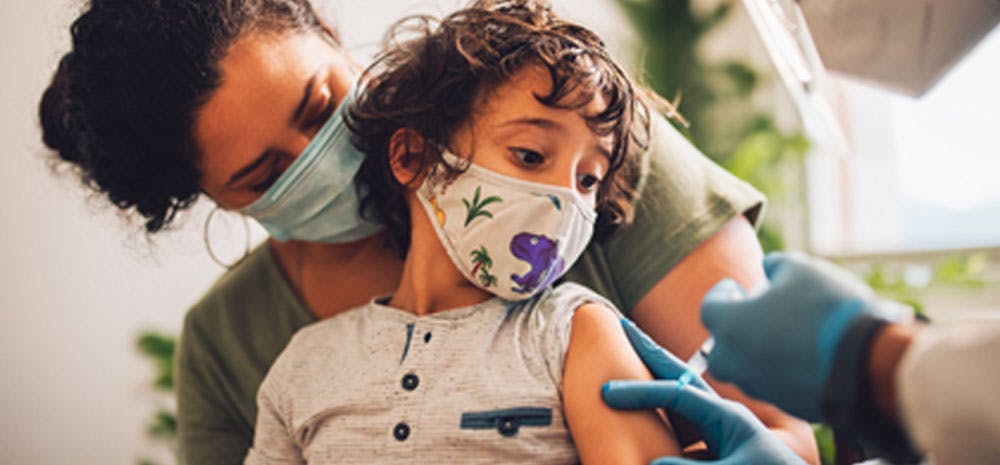Navigating Your Questions About Vaccinating Kids

Is my child eligible for the COVID-19 vaccine now?
On November 2, 2021, the Pfizer-BioNTech vaccine was approved for children ages 5 and older. This applies to approximately 28 million children in the United States. Dosages are administered based upon age, not size or weight. The American Academy of Pediatrics provides additional details here.
Is the vaccine safe?
“The risk of severe disease or complications due to COVID‑19 is higher than any potential risks posed by the vaccine – even for kids,” Jeffrey Kahn, director of Infectious Disease at Children’s Health and professor at UT Southwestern, said. “Given this, and the benefits of vaccination, I hope parents will see the importance of vaccinating their children.”
How and where will the vaccine be distributed?
The pediatric version of the vaccine will be administered by a variety of providers, including pediatrician’s offices, hospitals and medical practices; pharmacies; and state and local public health departments. Talk to your child’s pediatrician or care provider about options available to you. To find a COVID-19 vaccine, visit vaccines.gov, text your ZIP code to 438829, or call 1-800-232-0233 to find locations.
How much will the vaccine cost me?
COVID-19 vaccines are available for everyone at no cost. According to the CDC COVID-19 Vaccination Provider Agreement, providers administering COVID-19 vaccines cannot charge you for a vaccine or charge you directly for any administration fees, copays or coinsurance. They also cannot deny COVID-19 vaccination to anyone based on their health coverage status.
Because the vaccine is distributed through so many different organizations across the country, parents should always check first to confirm that there will be no expenses related to the administration of the vaccine.
Are employers required to allow time off for parents to have their children vaccinated and/or to care for them should they experience side effects?
Although the government has not mandated that employers provide time off for parents to get their children vaccinated, the CDC has recommended that employers do not require a doctor’s note or proof of visit for vaccinations or related sick time for adults or children of any age.
My child is nervous about the vaccine. How can I best prepare them for the appointment?
To help alleviate concerns, talk to your pediatrician or pharmacist about any questions that you or your child may have. When it’s time for the appointment, plan ahead to help make the experience easier. Bringing along a favorite stuffed animal, blanket or toy can help distract and comfort your child.
This video from the American Academy of Pediatrics’ HealthyChildren.org blog shares tips for talking with your child about how the vaccine works to protect them. For children who enjoy Sesame Street, here are links to videos featuring the characters asking questions and talking about being vaccinated. For example, here’s Big Bird talking about his fears about the vaccine. Parents and healthcare providers can find more resources from Sesame Street here.
What if my child needs their flu vaccine and the COVID-19 vaccine? Can both be given at the same time?
Yes. Your child can receive both vaccinations at the same time. However, the American Academy of Pediatrics recommends the vaccines be administered in different injection sites. Learn more about the AAP recommendations here.
My child is about to turn 12. Should they wait and receive the adult dose of the COVID-19 vaccine?
Children are still at risk of contracting COVID-19 while they wait. This article from Healthline shares some considerations for parents and caregivers regarding which dose is most appropriate for their child. Be sure to talk to your pediatrician or local pharmacist about the best approach for your child.
My child has a preexisting health condition. Is the vaccine safe for them?
Children with special healthcare needs should continue to receive all recommended vaccines. The CDC recommends the vaccine for all children ages 5-11. Talk with your doctor about any health conditions, such as diabetes, cancer, heart conditions or obesity, that may put your child at higher risk for getting very sick from COVID-19 and about getting a COVID-19 vaccine. Some adolescents and teens who already received two doses of the mRNA COVID-19 vaccines and have weakened immune systems can now get a third dose of vaccine. Learn more here.
Are there any concerns regarding long-term reproductive side effects?
Cincinnati Children’s Hospital and Medical Center experts note there is zero scientifically based evidence that COVID-19 vaccines affect fertility. The American College of Gynecology recommends that women who are pregnant or are breastfeeding get the vaccine when they become eligible.
For the most up-to-date information and resources on the COVID-19 vaccine, please visit VaccinateYourFamily.org.


